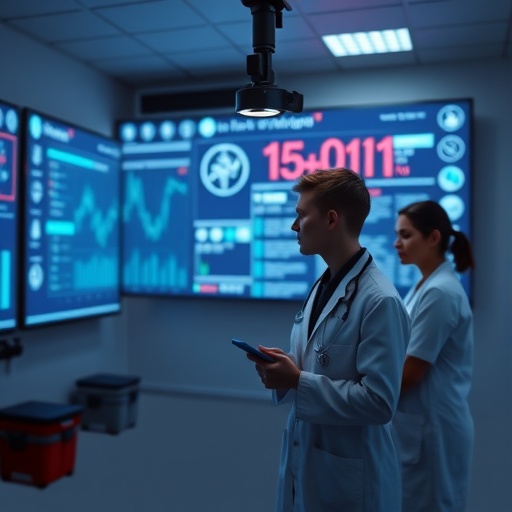Harnessing Machine Learning to Enhance Medical Education: A New Frontier in Psychophysiological Research
In the ever-evolving landscape of medical education, researchers are continuously seeking innovative methods to improve the training of medical professionals. A groundbreaking study by Moreno, Grewal, Cutumisu, and colleagues delves into the intersection of technology and education, specifically focusing on the application of machine learning in predicting psychophysiological responses of medical trainees. This study, titled “Employing Machine Learning to Predict Medical Trainees’ Psychophysiological Responses and Self- and Socially- Shared Regulated Learning Strategies While Completing Medical Simulations,” marks a significant milestone in understanding how trainees interact with simulated medical scenarios.
At its core, the research evaluates the psychophysiological responses of medical trainees during simulation exercises—a critical component of medical training. These simulations provide an invaluable experience for healthcare practitioners, allowing them to engage in realistic scenarios that mimic real-life medical crises. It is within these high-pressure environments that emotional and physiological responses can significantly impact learning outcomes. By leveraging machine learning algorithms, the study aims to uncover how these responses correlate with learning strategies employed by the trainees, thereby offering insights into how to optimize training programs.
The implications of understanding psychophysiological responses are profound. The study posits that medical trainees experience a range of emotional and physiological reactions, such as stress or anxiety, during simulations. These reactions not only affect their immediate performance but may also influence their retention of knowledge and skills. By employing machine learning techniques, the researchers were able to analyze large datasets derived from various psychophysiological markers, including heart rate variability and cortisol levels, which can indicate stress responses.
Machine learning, a subfield of artificial intelligence, has the potential to revolutionize educational methodologies by providing predictive insights based on data analysis. In the context of this study, machine learning models were trained to recognize patterns within the psychophysiological data collected during simulations. The outcome of this analysis offers an advanced understanding of how trainees respond emotionally and physically, allowing trainers to tailor their approaches to meet the specific needs of each individual.
The research methodology was rigorous and comprehensive, incorporating a wide array of data collection methods. Medical trainees underwent various simulation scenarios, during which their psychophysiological metrics were recorded. This data was then processed using sophisticated machine learning algorithms that identified correlations and trends. Moreover, the study sought to understand how trainees shared learning experiences, both self-regulated and socially shared. This dual focus on intrapersonal and interpersonal learning strategies provides a more holistic view of medical education.
The results of this research hold significant implications for curriculum developers and medical educators. By understanding the specific emotional and physiological triggers associated with different types of simulations, educators can create more effective training programs that integrate these insights. Customizing training regimens based on individual trainees’ responses could lead to enhanced learning experiences, ultimately improving the skill sets of future healthcare providers.
Moreover, the use of machine learning to analyze psychophysiological data could pave the way for more personalized education systems within medical training. Each trainee is unique, with distinct learning styles and emotional responses. The ability to predict and adapt to these individual differences could drastically improve training efficiency and outcomes. Educational institutions could utilize these insights to develop bespoke learning strategies that cater to the diverse needs of their students.
As the study unfolds, it highlights the necessity for further exploration and refinement of these machine learning models. Future research will be critical in validating the predictive capabilities of these algorithms across various educational settings and learning environments. By continuing to refine these models, there is potential for wider applications beyond medical training, which could benefit other fields that require high-stress decision-making skills.
In addition to educational benefits, this research raises important ethical considerations regarding the use of technology in training. Understanding the fine line between data use and privacy will be crucial as educational institutions begin to implement such technologies. Careful consideration must be given to how psychophysiological data is collected, analyzed, and stored, ensuring that trainee confidentiality is maintained throughout the process.
This study’s findings contribute to a growing body of literature advocating for the integration of technology into educational practices. The use of machine learning not only enhances the training process but also prepares students for a future increasingly characterized by technological advancements. As healthcare continues to evolve, so too must the methods used to train those who will enter the field, ensuring they are equipped with the skills and knowledge necessary to navigate both the complexities of medicine and the technological tools at their disposal.
In conclusion, the research conducted by Moreno and colleagues serves as a pivotal contribution to the interface of machine learning and medical training. By uncovering the intricate relationships between psychophysiological responses and educational outcomes, this study lays the groundwork for future developments in medical education. It highlights the potential of machine learning to inform teaching methodologies and tailor training programs to better fit the needs of individual trainees.
As the medical community looks toward a future integrated with technology, studies like this emphasize the importance of understanding human behavior in complex environments. In doing so, it promises an evolution in how future healthcare professionals are trained, ultimately leading to higher standards of patient care and outcomes.
Subject of Research: The study focuses on predicting medical trainees’ psychophysiological responses and their learning strategies during medical simulations using machine learning.
Article Title: Employing Machine Learning to Predict Medical Trainees’ Psychophysiological Responses and Self- and Socially- Shared Regulated Learning Strategies While Completing Medical Simulations.
Article References:
Moreno, M., Grewal, K., Cutumisu, M. et al. Employing Machine Learning to Predict Medical Trainees’ Psychophysiological Responses and Self- and Socially- Shared Regulated Learning Strategies While Completing Medical Simulations.
Educ Psychol Rev 37, 70 (2025). https://doi.org/10.1007/s10648-025-10044-0
Image Credits: AI Generated
DOI: 10.1007/s10648-025-10044-0
Keywords: Machine learning, medical education, psychophysiological responses, simulations, learning strategies.




